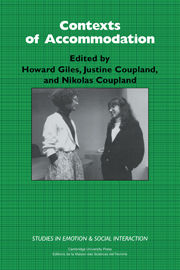Book contents
- Frontmatter
- Contents
- List of contributors
- 1 Accommodation theory: Communication, context, and consequence
- 2 Audience accommodation in the mass media
- 3 Accommodation on trial: Processes of communicative accommodation in courtroom interaction
- 4 Accommodation in medical consultations
- 5 Accommodation and mental disability
- 6 Accommodation in therapy
- 7 Accommodation in native-nonnative interactions: Going beyond the “what” to the “why” in second-language research
- 8 Interethnic accommodation: The role of norms
- 9 Organizational communication and accommodation: Toward some conceptual and empirical links
- Index
3 - Accommodation on trial: Processes of communicative accommodation in courtroom interaction
Published online by Cambridge University Press: 18 March 2010
- Frontmatter
- Contents
- List of contributors
- 1 Accommodation theory: Communication, context, and consequence
- 2 Audience accommodation in the mass media
- 3 Accommodation on trial: Processes of communicative accommodation in courtroom interaction
- 4 Accommodation in medical consultations
- 5 Accommodation and mental disability
- 6 Accommodation in therapy
- 7 Accommodation in native-nonnative interactions: Going beyond the “what” to the “why” in second-language research
- 8 Interethnic accommodation: The role of norms
- 9 Organizational communication and accommodation: Toward some conceptual and empirical links
- Index
Summary
Introduction
This chapter is concerned with discourse in criminal court trials. Hence we will deal with highly asymmetrical social situations, encounters between professionals/experts (judges and lawyers) and laymen/clients (defendants and witnesses), that is, interactants who are widely different in terms of power, status, competence, perspectives, and, presumably, interests and intentions. Specifically, this chapter deals with various accommodative processes (adjustments, attunings) occurring between participants and across trial phases. In my analysis, I use the theoretical framework of speech or communication accommodation theory (SAT or CAT), which has been developed and successively refined over the last fifteen years, chiefly by Howard Giles and his collaborators. As is well known, this theory is designed to elucidate the sociolinguistic mechanisms of, and the social psychological processes underlying, discourse and interaction in various types of social encounters. I assume that the reader is familiar with the basic concepts and major versions of the theory (see recent overviews in Giles et al. 1987; N. Coupland et al. 1988; and the introduction by Giles, Coupland, and Coupland, to this volume). In accordance with recent proposals (e.g., Coupland and Giles 1988), I favor the term “communication accommodation theory (CAT).”
Work in CAT has recognized that accommodative orientations and strategies (and their evaluations by actors and observers) may be quite different under different contextual conditions. Although a major part of this research has used communication in experimental contexts, often but not always (see Thakerar, Giles, and Cheshire 1982) involving subjects of more or less equal status, we are concerned with discourse in an authentic and strongly asymmetrical situation.
- Type
- Chapter
- Information
- Contexts of AccommodationDevelopments in Applied Sociolinguistics, pp. 103 - 130Publisher: Cambridge University PressPrint publication year: 1991
- 8
- Cited by



